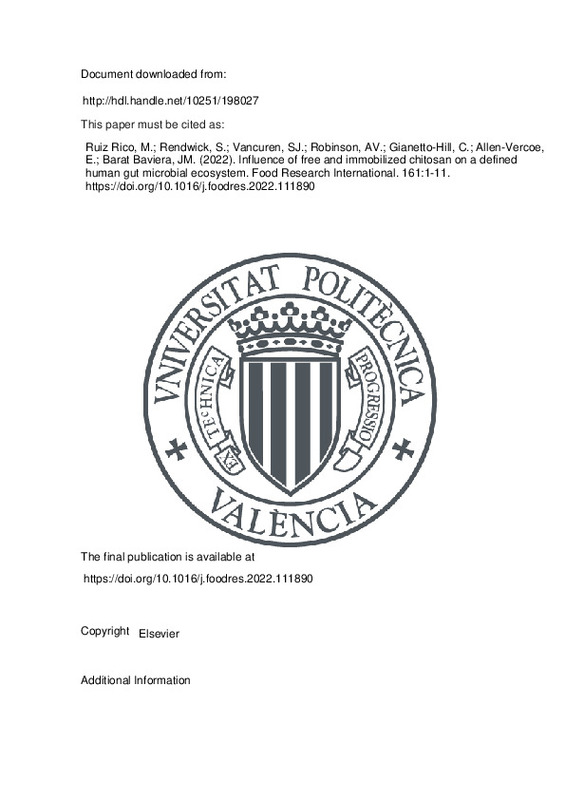JavaScript is disabled for your browser. Some features of this site may not work without it.
Buscar en RiuNet
Listar
Mi cuenta
Estadísticas
Ayuda RiuNet
Admin. UPV
Influence of free and immobilized chitosan on a defined human gut microbial ecosystem
Mostrar el registro sencillo del ítem
Ficheros en el ítem
| dc.contributor.author | Ruiz Rico, María
|
es_ES |
| dc.contributor.author | Rendwick, Simone
|
es_ES |
| dc.contributor.author | Vancuren, Sarah J.
|
es_ES |
| dc.contributor.author | Robinson, Avery V.
|
es_ES |
| dc.contributor.author | Gianetto-Hill, Connor
|
es_ES |
| dc.contributor.author | Allen-Vercoe, Emma
|
es_ES |
| dc.contributor.author | Barat Baviera, José Manuel
|
es_ES |
| dc.date.accessioned | 2023-10-11T18:02:19Z | |
| dc.date.available | 2023-10-11T18:02:19Z | |
| dc.date.issued | 2022-11 | es_ES |
| dc.identifier.issn | 0963-9969 | es_ES |
| dc.identifier.uri | http://hdl.handle.net/10251/198027 | |
| dc.description.abstract | [EN] In this work, the influence of different forms of presentation of chitosan in the human gut microbiota with a defined bacterial community was evaluated. First, the susceptibility of individual gut bacterial isolates against chitosan was studied within a concentration range between 0.125 and 1 mg/mL. Then, the impact of chitosan (0.25 and 1 mg/mL) on a defined human gut microbial ecosystem was studied by metagenomic and metabonomic analyses. The results showed that chitosan in its free form had a high impact on individual isolates with a minimum inhibitory concentration below 1 mg/mL for most of the strains studied. In comparison, chitosan immobilized in the different carriers displayed a diverse effect on gut microbiota. The most susceptible strains were Agathobacter rectalis strain 16-6-I 1 FAA, Clostridium spiroforme strain 16-6-I 21 FAA and Mediterraneibacter faecis strain 16-6-I 30 FAA. The impact of the different modes of presentation of chitosan was strain-specific and species-specific when compared to results obtained from analysis of other strains within the genera Agathobacter, Clostridium and Mediterraneibacter, and therefore a study using a defined ecosystem was needed to extrapolate the results. Significant decreases in defined community richness and diversity and changes in metabolic profile were observed after exposure to free chitosan. Free chitosan produced significant reductions in the abundance of the genera Lachnoclostridium, Anaerotignum, Blautia, Enterococcus, Eubacterium and Ruthenibacterium together with a slight decrease of the production of SCFAs, among other fermentation by-products. The immobilized chitosan significantly alleviated the impact caused by the antimicrobial polymer and significantly increased the relative abundance of the Bacteroidetes phylum compared to free chitosan. These results suggest the significance of assessing the impact of new ingredients and materials included in food on the human gut microbiota with models that simulate the gastrointestinal environment, such as in vitro bioreactor systems. | es_ES |
| dc.description.sponsorship | The authors gratefully acknowledge the financial support from the grant RTI2018-101599-B-C21 of the project "Retos Investigacion" funded by MCIN/AEI/10.13039/501100011033 and by "ERDF A way of making Europe". MRR acknowledges the Generalitat Valenciana for her postdoctoral fellowship (APOSTD/2019/118). | es_ES |
| dc.language | Inglés | es_ES |
| dc.publisher | Elsevier | es_ES |
| dc.relation.ispartof | Food Research International | es_ES |
| dc.rights | Reconocimiento - No comercial - Sin obra derivada (by-nc-nd) | es_ES |
| dc.subject | Antimicrobial polymer | es_ES |
| dc.subject | Bacterial gut isolates | es_ES |
| dc.subject | Bacteroidetes | es_ES |
| dc.subject | Covalent immobilization | es_ES |
| dc.subject | Defined gut microbial community | es_ES |
| dc.subject | Food preservatives | es_ES |
| dc.subject.classification | TECNOLOGIA DE ALIMENTOS | es_ES |
| dc.title | Influence of free and immobilized chitosan on a defined human gut microbial ecosystem | es_ES |
| dc.type | Artículo | es_ES |
| dc.identifier.doi | 10.1016/j.foodres.2022.111890 | es_ES |
| dc.relation.projectID | info:eu-repo/grantAgreement/AEI/Plan Estatal de Investigación Científica y Técnica y de Innovación 2017-2020/RTI2018-101599-B-C21/ES/DESARROLLO Y APLICACION DE SISTEMAS ANTIMICROBIANOS PARA LA INDUSTRIA ALIMENTARIA BASADOS EN SUPERFICIES FUNCIONALIZADAS Y SISTEMAS DE LIBERACION CONTROLADA/ | es_ES |
| dc.relation.projectID | info:eu-repo/grantAgreement/GENERALITAT VALENCIANA//APOSTD%2F2019%2F118//CONTRATO POSDOCTORAL GVA-RUIZ RICO. PROYECTO: DESARROLLO DE NUEVOS SISTEMAS ANTIMICROBIANOS / | es_ES |
| dc.rights.accessRights | Abierto | es_ES |
| dc.contributor.affiliation | Universitat Politècnica de València. Escuela Técnica Superior de Ingeniería Agronómica y del Medio Natural - Escola Tècnica Superior d'Enginyeria Agronòmica i del Medi Natural | es_ES |
| dc.description.bibliographicCitation | Ruiz Rico, M.; Rendwick, S.; Vancuren, SJ.; Robinson, AV.; Gianetto-Hill, C.; Allen-Vercoe, E.; Barat Baviera, JM. (2022). Influence of free and immobilized chitosan on a defined human gut microbial ecosystem. Food Research International. 161:1-11. https://doi.org/10.1016/j.foodres.2022.111890 | es_ES |
| dc.description.accrualMethod | S | es_ES |
| dc.relation.publisherversion | https://doi.org/10.1016/j.foodres.2022.111890 | es_ES |
| dc.description.upvformatpinicio | 1 | es_ES |
| dc.description.upvformatpfin | 11 | es_ES |
| dc.type.version | info:eu-repo/semantics/publishedVersion | es_ES |
| dc.description.volume | 161 | es_ES |
| dc.identifier.pmid | 36192998 | es_ES |
| dc.relation.pasarela | S\470838 | es_ES |
| dc.contributor.funder | GENERALITAT VALENCIANA | es_ES |
| dc.contributor.funder | AGENCIA ESTATAL DE INVESTIGACION | es_ES |
| dc.contributor.funder | European Regional Development Fund | es_ES |
| dc.subject.ods | 02.- Poner fin al hambre, conseguir la seguridad alimentaria y una mejor nutrición, y promover la agricultura sostenible | es_ES |
| dc.subject.ods | 03.- Garantizar una vida saludable y promover el bienestar para todos y todas en todas las edades | es_ES |







![[Cerrado]](/themes/UPV/images/candado.png)

